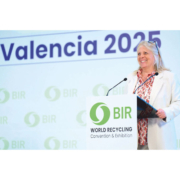International Environment Council: Opportunity for Industry to Gain from “Green” Activities
National recycling organisations are being urged to take steps to ensure the materials, machinery and equipment used by their members are recognised as “environmental goods” to benefit from potential financial incentives for activities contributing to environmental and climate protection goals.
Members of the Bureau of International Recycling were told at their Convention in Dubai that the World Trade Organization (WTO) wants to reduce trade barriers and limit tariffs for environmental goods while supporting international supply chains.
Alev Somer, BIR’s deputy Director for Environment and Trade, told the International Environment Council session on 17 October 2022 that upcoming negotiations on an Environmental Goods Agreement (EGA) were “a golden opportunity for us”. She explained that the EGA initiative was first kicked off by the WTO in 2014 but momentum had been lost after 2016. Efforts had now been relaunched and Ms Somer called for contributions from BIR members. “We would like to be proactive in that discussion and any feedback you have would be very appreciated,” she said. “We should be on top of this because it’s good to promote our industry as an important contributor to the circular economy. We would like to have the most guaranteed recycled materials we can put into that list of environmental goods and we need to finalise that quite quickly.”
Regulatory matters continue to dominate IEC sessions and another appeal for evidence came from Ross Bartley, Director for Environment and Trade, who reminded attendees that agreed changes at the OECD’s Basel Convention, that changed the listing on non-hazardous e-scrap, would require future country-to-country shipments of e-scrap having a notification and certification system similar to plastic that had changed lists in 2019. “Notification is known to be very slow: Governments work at the speed of administrators, while we work at the speed of business,” he said. While industry wanted this process to be less than two weeks, anecdotes suggested it could take up to three years. Mr Bartley called for members to contribute real examples of how long notifications take to be agreed to support the BIR case: “Their intention wasn’t to be inefficient but they have designed an ineffective notification process,” he concluded.
Proposed changes to EU’s waste shipment regulations (WSR) continue to concern European exporters of scrap and their customers. A presentation to the session by Emmanuel Katrakis, Secretary General of EuRIC, the umbrella organisation for European Recycling Industries, was subtitled: “The EU at a turning point”. Revision of the Waste Shipment Regulation (EC) No 1013/2006 seeks to establish a centralised and harmonised digital system intra-EU shipments for reuse and/or recycling while tackling illegal shipments and, for shipments leaving the EU, improving the standards of recycling in importing countries. A list would be drawn up of countries to which exports are allowed and receiving companies would have to be audited. EuRIC is concerned the proposals undermine free trade and Mr Katrakis argued it was the wrong time for such change. “With the energy crisis, we should slow down a bit and step back and fix the energy crisis before we go too fast and too full. It’s a collective endeavour. National associations, BIR [and others] are coming together to mitigate the risks and do the best for the recycling industry.” His concern was shared by BIR Director General Arnaud Brunet who told the session: “BIR stands by both the exporters and the importers who need access to these resources.”
A wider question was addressed by IEC Chairman Olivier François who argued that quantifying the recycling industry‘s worth would help the media and public have a greater awareness of its role.
He pointed out data from EuRIC which shows that nearly 80% of the total turnover from recycling in the EU 27 is from the ferrous and non-ferrous sectors. “Those activities are the backbone of the recycling industry and this is frequently underestimated by the authorities who don’t see the critical role of metal recycling in fuelling the global recycling industry,” he said.
Quoting the EU steel industry, he said ferrous recycling accounted for nearly 40% of the overall recycling sector, employed 300, 000 people and was worth €40 billion. Meanwhile, EU steel mills, considered a very large industry, were worth €97 billion and employed 326,000.
“Aside from a few experts inside our companies, nobody knows what we are doing and the economic weight of our industry is always underestimated,” Mr François said. “We have to continue to reference the role of the recycling industry compared to other industries.”
Source: BIR (Brussels, 24 October 2022)







